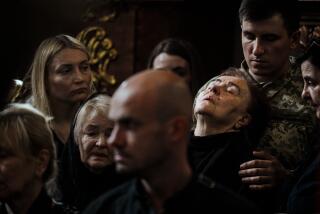Serbs Exhume Loved Ones, Mourn Death of a Dream
- Share via
SOKOLAC, Bosnia-Herzego-vina — Nebojsa Lalic was killed in the war three years ago, but the Bosnian Serb soldier died a different kind of death last week on a rolling meadow trimmed with Christmas trees.
His corpse arrived here in the back of a meat truck. His mother, father and wife followed in a car, an 18-hour journey from their home in suburban Sarajevo. Filip, the 3-year-old son Lalic never met, was kept away.
“You were fighting for nothing, my dear child,” Desa Lalic said as she sobbed over her son’s casket. “For what did you give away your youth? You should know how difficult this is for your mother.”
Tens of thousands of Bosnian Serbs have fled the Serb-populated suburbs of the Bosnian capital in recent weeks, stuffing everything from bathtubs to telephone wiring in their cars and trucks.
But in a second, more private and reverent exodus, hundreds of Sarajevo’s dead have also taken to the road, their heartbroken loved ones towing them along icy, jammed mountain routes to this new resting place secure in Bosnian Serb territory.
At least 30 of them arrive every day and night in Sokolac, where Bosnian Serb authorities have hurriedly converted a Christmas tree farm into a graveyard for the displaced.
The eerie rhythm of pickaxes and a steam shovel records the lifeless processional, a humiliating postscript to the sacrifice of the Bosnian Serb war dead.
“Every day is more and more difficult because they are coming all the time,” Father Milorad Ljubinac, the local Orthodox priest who tends to ceremonial needs at the reburials, said Saturday. “Last night we had three trucks arrive at the same time, the first with seven coffins, the second with 11 and the last with eight.”
For mourning family members, it is a relief finally to reach Sokolac, but leaving their fallen soldiers in this strange place has also meant confronting another passing: the dream of a Bosnian Serb Sarajevo.
The first time Lalic was lowered into the earth, in 1993, it was wrenching but somehow understood. He died doing what a man does in war, a soldier gunned down fighting for his hometown. For Lalic, it was the Sarajevo suburb of Vogosca, where he spent all 26 of his years, married his high school sweetheart and was laid to rest in the local graveyard.
*
When the frozen ground tumbled onto his coffin a second time, last week, the world was a different place. Muslim and Croatian police were patrolling the streets of Vogosca, which had been peacefully surrendered by the Bosnian Serbs under the Dayton, Ohio, peace accord.
The soil around his new grave was Serbian, but it was faraway and unknown.
“It was difficult then, but this time it is worse,” said Desa Lalic, the tears on her puffy cheeks glistening in the winter sun. “We had to surrender everything to our enemies. It turns out that all of our children died in vain.”
The retreat to the cemetery here has been hard to comprehend for many Serbs. Although the Bosnian Serb army did not lose the war--under the peace accord, Bosnian Serbs retain 49% of Bosnia-Herzegovina--the voluntary hand-over of the capital’s suburbs has left residents feeling lost and betrayed.
By now, most have come to terms with the upheaval the peace accord is bringing to their lives, but it is taking longer to block the memories that come with digging up their dead.
*
Sanja Petrovic saw her father die in 1992 when a rocket-propelled grenade struck outside their home near Vogosca. She too was in Sokolac to bring his remains to safety.
She never considered leaving his grave behind, she said, because she feared that Muslim extremists would desecrate it.
“I don’t know where I found the strength to do this,” said Petrovic, breaking down in tears. “We did this all ourselves. Nobody helped. The digging, the organizing. All of it.”
It costs about $350 to hire a truck and driver to make the trip from Sarajevo to Sokolac, which takes between 15 and 20 hours if the driver is afraid to cross Bosnian government territory.
To save money, friends and family have shared vehicles; Petrovic’s father arrived beside the bodies of his neighbor’s two brothers and son. Lalic made the journey with his best friend.
About 300 reburials have taken place so far--most of them in the past two weeks--with preparations underway for as many as 2,000 more.
More to Read
Sign up for Essential California
The most important California stories and recommendations in your inbox every morning.
You may occasionally receive promotional content from the Los Angeles Times.









